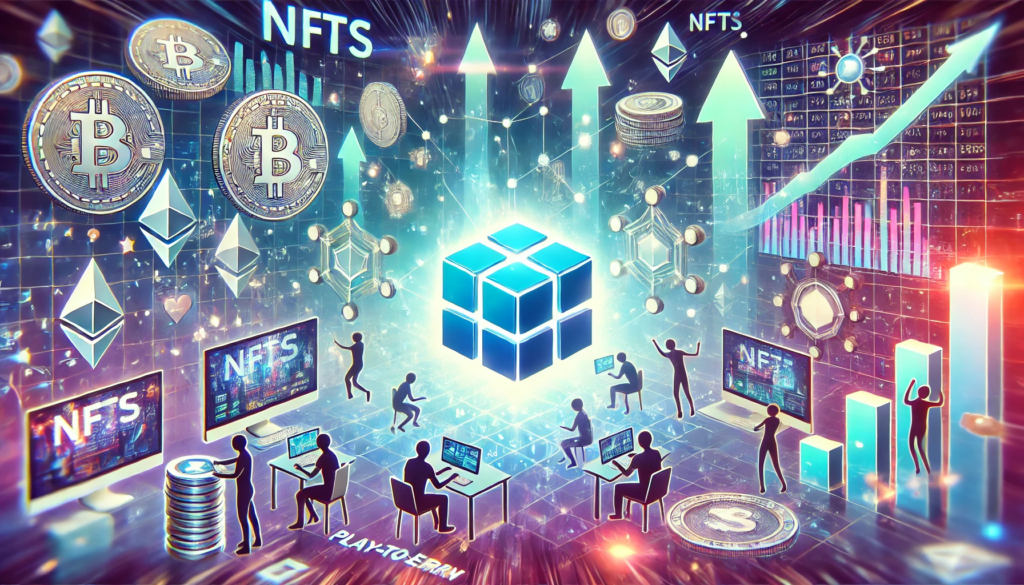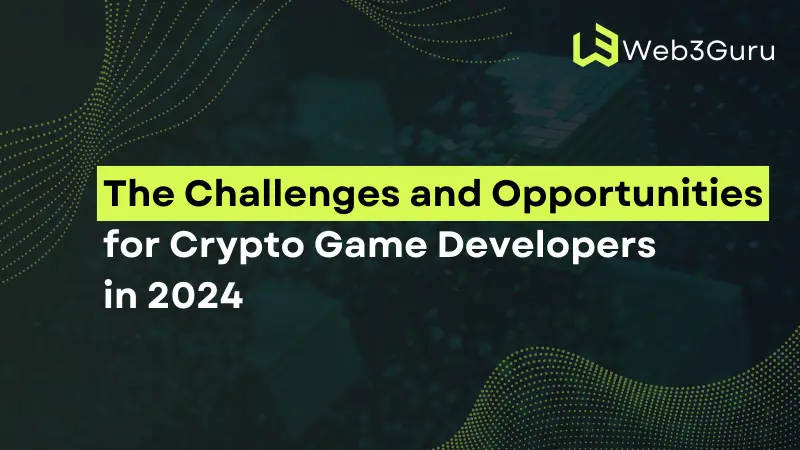Contents
Introduction
The crypto gaming industry has rapidly expanded, giving developers a unique opportunity to combine blockchain technology with interactive entertainment. As 2024 approaches, this sector continues to evolve, presenting the challenges and opportunities that developers must navigate to innovate and succeed.
In this post, we’ll dive into the challenges and opportunities crypto game developers will encounter in 2024, as well as the potential advancements shaping the future of blockchain gaming.
The Evolving Landscape of Crypto Gaming

As the crypto gaming industry continues to mature, 2024 is shaping up to be a pivotal year for developers. New technologies and increasing global interest in blockchain-based gaming are driving change across the sector. With that momentum comes a dynamic mix of growth opportunities and technological innovations that developers must navigate to succeed.
Market Growth
The blockchain gaming sector is expected to experience significant expansion in 2024. With increased global adoption, the number of daily active users is on the rise, pushing the market to new heights.
This trend is driven not only by gamers’ interest in owning in-game assets but also by the financial opportunities provided by play-to-earn models, which are attracting more players every day. The growing appeal of these games will continue to fuel market growth, encouraging developers to push the boundaries of what’s possible.
Technological Innovations
Technological advancements are also set to revolutionize the way crypto games are developed and experienced. Emerging technologies like zero-knowledge proofs (ZK-proofs) are becoming increasingly important.
These technologies can streamline the development process by enhancing the privacy and security of blockchain transactions without sacrificing efficiency. Additionally, the integration of AI and digital twin technologies is expected to create more immersive and responsive gaming environments, elevating the player experience to a whole new level.
These innovations are poised to be game-changers in 2024, making this year a crucial time for crypto game developers to embrace cutting-edge technology.
Key Challenges in 2024
Despite the exciting growth and innovation in the crypto gaming space, there are significant hurdles that developers must overcome in 2024. These challenges could impact both the development process and user experience, making it crucial for developers to address them effectively.
Scalability Issues
One of the most pressing challenges is scalability. Network congestion and high transaction fees can severely disrupt gameplay, leading to frustration among players. When transactions take too long or fees become prohibitive, user retention drops, and the overall satisfaction with the game suffers. This issue is especially problematic for games built on blockchains that struggle with throughput, making it a critical area for developers to focus on.
Regulatory Uncertainty
The lack of clear regulatory frameworks around blockchain and crypto gaming poses another significant challenge. Developers are navigating a complex legal landscape where rules are still evolving, creating compliance risks that can slow down progress or even lead to legal disputes.
The uncertainty around how different countries will regulate crypto games adds another layer of difficulty, forcing developers to remain adaptable and cautious when expanding into new markets.
Market Fragmentation
Interoperability between different blockchain networks remains a major hurdle in 2024. The lack of seamless connectivity between various networks limits the portability of in-game assets across platforms.
This fragmentation restricts the player’s ability to transfer or trade assets freely between games, which can discourage long-term engagement. Addressing this challenge will require collaboration between developers and blockchain providers to create more integrated ecosystems.
Security Concerns
With the rise of crypto gaming, security has become a top concern. Hacking, phishing attacks, and vulnerabilities in smart contracts are significant risks that could compromise both developers and players. Implementing robust security measures is crucial to prevent losses and maintain trust within the community.
Developers must prioritize security audits and ensure that their platforms are fortified against potential threats to safeguard both in-game assets and user data.
Opportunities for Growth

While challenges exist, 2024 also offers significant opportunities for crypto game developers. These opportunities have the potential to redefine the gaming experience and create new pathways for revenue and engagement.
Play-to-Earn (P2E) Models
Play-to-earn (P2E) games have gained substantial traction in recent years, and this trend is expected to continue growing in 2024. These models allow players to earn rewards, such as tokens or in-game assets, that can be traded or sold in secondary markets. This creates new revenue streams for both players and developers, as in-game economies flourish.
The rising popularity of P2E not only incentivizes more players to participate but also opens up opportunities for developers to create sustainable, long-term engagement through financial rewards.
NFT Integration
Non-fungible tokens (NFTs) are playing an increasingly important role in crypto gaming. By transforming in-game assets into unique and tradable items, NFTs add value to the gaming experience, enhancing player engagement and creating new monetization opportunities.
Players can now truly own their digital assets, which can be traded across platforms or sold for profit. This integration of NFTs is helping to blur the lines between traditional gaming and decentralized finance, making games more appealing to both casual and serious players.
Community-Driven Development
Another emerging opportunity is the adoption of community-driven development models. Decentralized governance, where players have a say in the future direction of a game, is becoming a powerful tool for building loyal and engaged communities.
By allowing players to vote on game features, updates, or even in-game economies, developers can create a more interactive and personalized experience. This not only fosters a sense of ownership among players but also helps developers shape their games based on user feedback, ensuring long-term satisfaction and success.
Strategic Approaches for Developers
To succeed in 2024, crypto game developers must take proactive and strategic approaches to overcome the challenges and seize the opportunities the market presents. By adopting the right strategies, developers can build more resilient, engaging, and compliant games.
Adopting Scalable Solutions
One of the primary concerns in crypto gaming is the issue of scalability. Developers can address this by integrating layer-2 solutions and interoperability protocols. These solutions help manage network congestion and reduce transaction fees, ensuring smoother gameplay and improving the overall user experience. By focusing on scalability, developers can not only retain their user base but also attract new players who seek efficient and responsive gaming platforms.
The evolving regulatory landscape is another factor that developers need to navigate carefully. Engaging with regulators proactively and staying updated on legal changes can help avoid compliance risks.
Developers should adopt flexible strategies that allow them to quickly adjust to new rules and requirements as they emerge. By doing so, they can ensure that their games remain accessible across different regions without running into legal obstacles that could hamper growth.
Enhancing Security Measures
Security is a critical issue in the crypto gaming world, and developers need to prioritize it to protect their platforms and users. Regular audits of smart contracts and the implementation of advanced security protocols can significantly reduce the risks of hacking and phishing attacks.
Additionally, educating users on best practices for online security can further mitigate potential threats. Ensuring a robust security framework will build trust with players, helping to maintain a loyal and engaged community.
The Road Ahead: Future Prospects
Looking ahead, the future of crypto gaming holds exciting possibilities. Developers who stay ahead of industry trends and technological advancements can expect to capitalize on the opportunities that lie ahead in the coming years.
Mass Adoption
While crypto gaming has seen impressive growth, full mainstream adoption is projected to take a bit longer. Experts predict that by 2025-2026, we could see crypto games reach a level where they are widely accepted by both casual and competitive gamers alike.
As blockchain technology becomes more integrated into the gaming world and scalability solutions improve, we can expect the barriers to entry to decrease, making crypto games more accessible to the general public.
Integration with Traditional Gaming
Another exciting prospect for the future is the potential collaboration between traditional gaming companies and blockchain projects. Hybrid gaming experiences that combine the best elements of both worlds could reshape the industry.
Traditional gaming companies may start integrating blockchain technology into their existing platforms, allowing for the ownership of in-game assets through NFTs and the inclusion of decentralized economies. This collaboration would not only broaden the appeal of crypto games but also introduce new audiences to the benefits of blockchain technology in gaming.
Conclusion
In 2024, crypto game developers will encounter the challenges and opportunities that come with a rapidly evolving industry. Issues like scalability, regulatory uncertainties, market fragmentation, and security concerns present significant hurdles. However, the rapid growth of the market, emerging technologies, and models like Play-to-Earn offer the opportunities for innovation and expansion.
To succeed, developers must stay informed and address the challenges and opportunities by adopting scalable solutions, navigating regulatory shifts, and enhancing security measures. By doing so, they can fully capitalize on the evolving crypto gaming landscape and deliver engaging, future-ready experiences for players.
